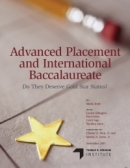The parent problem
Suburban parents aren't buying what school reformers are selling, argues budding conservative writer RiShawn Biddle in The American Spectator. "For middle-class parents, vouchers and charters are unappealing because they have already exercised choice--in the form of buying pricey homes in suburban neighborhoods.

